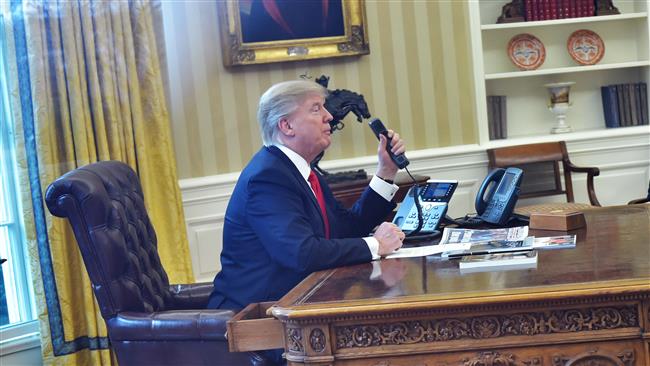
RNA - Trump has left out Saudi Arabia from the list of the banned countries because he does not want to disturb relations with Riyadh, columnist and political scientist from Washington Wilmer Leon says.
The new directive bans citizens of six Muslim-majority countries from entering the US, but removes Iraq from the original list. It will maintain a 90-day entry ban on citizens of Iran, Libya, Syria, Somalia, Sudan, and Yemen.
“If this is truly about terrorism and so-called keeping America safe, Saudi Arabia is absent from this list ... and it is because the United States does not want to disturb or interrupt the relationship that it has with the Saudis,” Leon told Press TV on Friday night.
Fifteen out of 19 hijackers, who slammed two planes into twin towers of the World Trade Center on September 11, 2001, were Saudi nationals and evidence suggests some of them were linked to high-ranking Saudi authorities like Bandar bin Sultan, a member of the House of Saud and Saudi Arabia’s ambassador to the US from 1983 to 2005.
The US Congress overwhelmingly voted in September 2016 to override then-president Barack Obama’s veto of the Justice Against Sponsors of Terrorism Act (JASTA), which clears the path to sue Riyadh for the 9/11 attacks that killed 3,000 people and destroyed some $10 billion in property.
Leon said the travel ban order “is primarily divisive because of the rhetoric that Donald Trump ran on, which was xenophobic, anti-immigrant and anti-Muslim.”
“It is a citizenship-based ban, which the Trump administration has imposed, which is unconstitutional and that is why this is becoming so divisive, because Donald Trump and his surrogates are targeting particular individuals from particular countries,” he said.
Leon said Trump had stated very clearly that it was a Muslim ban.
"Even some of his spokespeople and surrogates such as [Former New York City Mayor] Rudy Giuliani admitted that President Trump called him and asked him how to legally implement a Muslim ban.”
In February, the US Department of Homeland Security (DHS) failed to provide evidence that Iran and six other Muslim countries included in Trump’s entry order posed any terror threat to America.
“Donald Trump’s travel ban is a solution looking for a problem,” because data of terrorist attacks in the US shows that “people have been radicalized once they have been here two or three years,” Leon argued.
According to the columnist, the problem in the US is that “people not looking at the data, people not actually looking at the real sources of the problems, are playing to stereotypes; they’re playing to racism and they’re using fascist motivations.”
Michael Lane, president of American Institute for Foreign Policy from Washington, said, the second travel ban – Trump 2.0 – is certainly significantly watered down from first executive order that was issued in the very beginning days of his presidency.
He also said the six countries targeted by Trump’s executive order are 10 percent of Muslim population around the world; so, “it is not a Muslim ban.”
“These six countries are on this list because they are either failed states and there is no government there that’s able to work with the United States in terms of vetting and back-grounding people who want to come from there to the United States or they are not failed states but they are adversarial states,” the analyst opined.
“The reason Saudi Arabia is not on the list is because we have a good relationship with the kingdom and the government there and we have a good policy in place already for extreme vetting of anyone who wants to come to the United States from Saudi Arabia,” he added.
847/940